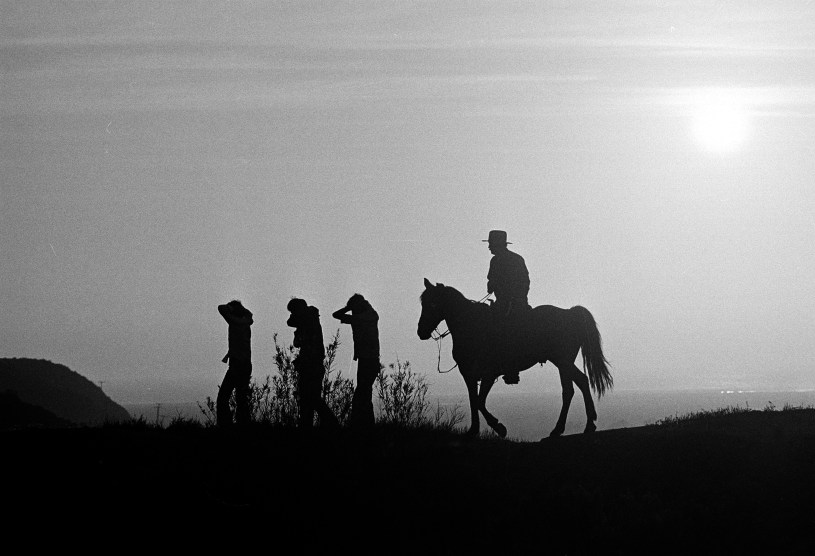The European Far Right just won’t go away. It surged in the 1990s, then ebbed; but it looks pretty vigorous today.
In Austria this week, the right-wing Freedom Party of Jorg Haider — who is on record as admiring Nazi employment policies and Saddam Hussein’s leadership —
did unexpectedly well in elections in the province where Haider is governor. In France, Jean-Marie Le Pen’s xenophobic National Front is also expected to do well in this month’s local elections. And in E.U. member countries, nationals who would never call themselves right-wing have solidly backed restrictions on entry by workers from soon-to-be-member countries in Eastern Europe.
Straightforward xenophobia is only part of it. Charismatic right-wing leaders play on social and economic fears and urge a break with “more of the same” from the entrenched conservative and socialist parties. They promise economic prosperity at a time of
unemployment, and national cohesion at a time when immigration and European integration are
re-shaping national identities. Leaders like Haider have also been good at calibrating their xenophobic rhetoric as the opinion polls dictate.
The collapse of Communism forced Europeans reevaluate the “post-war” consensus on everything
from social welfare to immigration and posed new challenges to national identity. In short, the
past decade has been a time of change and uncertainty – and the far-right has thrived on that. In a review, in the Guardian, of Angus Roxburgh’s “Preachers of Hate,” which explores the European far-right, British politician David
Lammy gives some useful context:
Roxburgh’s thesis is very simple. … [H]e suggests that far from
signalling the end of history, as Francis Fukuyama had predicted, the end of the cold war simply set the
world on a different (and in some ways older) historical trajectory in which national and cultural identities
replaced the state-versus-market relationship as the defining cleavage in global politics.
The rise of the far right, he suggests, can therefore be attributed to the confluence of both
global and nationally specific trends in the course of the 1990s. The end of the cold war unleashed a new
wave of nationalism, emanating from the new nations that arose from the ashes of the Soviet empire and
from parts of western Europe which feared for their economic prosperity now that their poor relations
were no longer behind the iron curtain.
On the other hand, wherever the
far right has succeeded it has done so by tapping into the fear and uncertainty that these global
developments produced, while framing them in a historical context specific to that country — from the
failure to come to terms with the legacy of fascism in Italy, Austria and eastern Germany, to the aridity of
a particular kind of consensus politics in France and the Netherlands.
In a shock result, the Freedom Party won 42.5% of the vote compared to the favored Social Democrats’ 38.4%. Haider is best known for
his party’s 1999 national performance, when it won 27% of the vote and became a coalition partner in the
government, which prompted sanctions by the European Union and then Haider to resign as party leader. He emerged more popular than ever because Austrians were
outraged at foreign meddling.
The Freedom Party slumped, though. During the 2002 national elections, for example, it got just 10 percent of the vote.
It’s not clear whether the Freedom Party’s success in the province of Corinthia will translate to the national level. Some
predict its continued decline and say this was an aberration. Haider is
credited with running an effective campaign — he moderated his xenophobic rhetoric and focused instead on
the bread and butter issues. As the BBC notes:
At one level, Mr Haider appears to have
changed his electoral tune. The anti-immigration slogans, the inflammatory remarks about Nazis and
prominent Jews played no part in this election campaign, which focused on staples such as pensions and
jobs, tourism and taxes.
Indeed the man whose party once used posters in an election campaign warning of Ueberfremdung — a word
last used by the Nazis to describe the country being “overrun with foreigners” — has been busy trying to
strike a deal with Carinthian minority groups which would see their language and identity protected.
Some observers don’t see Haider’s latest maneuvres as inconsistent. At the heart of Mr Haider’s successes
over the years, they say, is an innate sense of the issues which touch the working classes and a canny
ability to play at being both establishment and anti-establishment.
The campaign also showcased Haider’s flamboyancy and populism. As London’s Daily Telegraph notes:
[The] Porsche-driving millionaire had staked his political reputation on success in
Carinthia and pulled out all the stops, from free gifts such as cigarette lighters, watches, ski passes and
new cars for party members, to ‘Haider’ teddy bears, sweets for children and roses for women voters.
Pensioners will be able to get up to £50 each if they turn up at the
parliament building in Klagenfurt once Mr Haider is sworn into office. The Freedom Party defended the move
by saying people were not being forced to vote for it.
Haider may have moderated his message during this election, but Le Pen is unlikely to. The recent victory for the Far Right on banning the Islamic veil in French schools shows there’s a constituency for Le Pen’s message.
French voters over the years have been quite happy to vote for the National Front. Although Le
Pen was soundly beaten by the current center-right president Jacques Chirac in a 2002 run-off, the very fact
that he got that far was seen as a stark reminder of the electorate’s dissatisfaction with the
mainstream parties. Now it seems the French voters may use their “protest vote” for Le Pen as a signal to
Chirac to axe the current conservative Prime Minister Jean-Pierre Raffarin, whose fiscal
conservatism has sparked strikes by air traffic controllers and health workers among others.
The benefits Western Europeans have enjoyed for decades are under threat
from budget cuts, and the far-right has attacked what it sees as government indulgence toward
undeserving, lazy immigrants, whether from Eastern Europe or, until now more commonly, Africa and the Middle East. As the New
Yorker points out in a 1997 profile of Le Pen:
A third of France’s legal-immigrant population comes from Muslim countries,
predominantly in North Africa, and two-thirds of the French people regularly tell polltakers that they think
there are too many Arabs and Muslims in France. While the National Front picks up votes by insisting that
pork should remain on school menus, even people with impeccable ‘antiracist’ credentials agree with a
1994 ban against female students wearing the Islamic veil. Some argue that the veil is demeaning to the
women, but in the eyes of many others it is France that is demeaned by the spectacle of a woman who
doesn’t want to dress like Juliette Binoche.
European integration has been a gift to the Far Right. On the economic side, it plays to fears of
factories going abroad and cheap labor coming in — making an already dire unemployment situation worse.
One of the National Front’s most famous slogans is “three million unemployed, that’s three million
immigrants too many!” On May 1, the E.U. will expand from 10 to 25 member states to include new Eastern and
Central European nations, as well as the Baltic states, in what Europhiles trumpet as the “reuniting of
Europe.” But for the far-right the poorer Eastern
European states are leeches on their generous social welfare systems.
Roxburgh argues in “Preachers of Hate” that the success of far-right parties extends beyond its electoral victories. They have
transformed the platforms of mainstream conservative and even socialist parties to incorporate their
demands. The change in tone and substance has never been clearer than in the tightening of asylum laws
and the pre-emptive restrictions on immigration slapped by the existing European Union members on the
incoming member states.
This is unfortunate, because, in the end, these restrictions won’t deliver the promised effect that the
Far Right claims they will – jobs for the “real” Austrians, Frenchmen, Germans, Englishmen, and Swedes.
The restrictions, as Business Week argues, will only
prolong Western Europe’s economic stagnation by blocking new talent. And the Far Right’s fears of being swamped by the poor
Eastern neighbors are vastly exaggerated. As
Business Week points out:
The final irony is that the growing Western European fears of a tidal wave of immigration
are almost surely unfounded. An exhaustive European Commission study released in late February projects
that at most, around 220,000 citizens from new member states will be relocating every year to the west
over the next half-decade — hardly a gigantic shift in a union of 450 million people. So in the end, European
leaders are just pandering to fears. ‘What kind of Europe are we talking about that can’t absorb these
workers?’ asks Italian economist Renato Brunetta, a member of the European Parliament. ‘It’s a
shortsighted, egotistical Europe.’ It’s a low-growth Europe, too.









